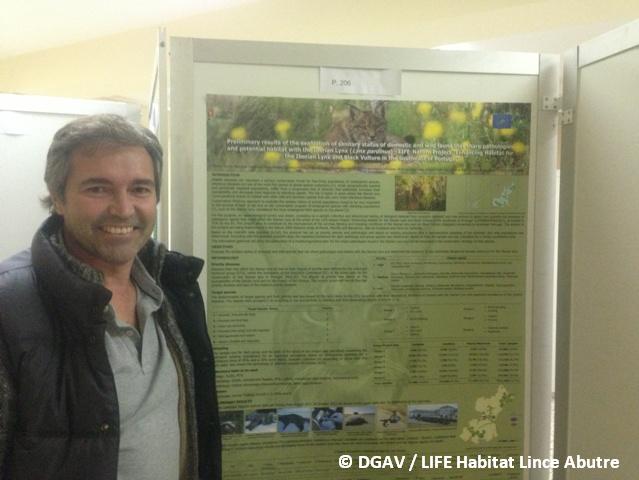Participation in the VIII International Symposium on Wildfauna
On the beginning of November we went to León (Spain) to participate in the VIII International Symposium on Wildfauna.
This meeting was organized by WAVES (Wild Animals Vigilance Euro-Mediterranean Society) and the University of León, and aimed to provide an opportunity for scientific training and exchange of experiences among professionals involved in the fields of Biology, Veterinary Medicine and Management and Conservation of Wildlife and Natural Areas.
In this symposium, Pedro Melo, veterinarian of the General Directorate of Food and Veterinary Services (DGAV) – one of the associated beneficiaries of Habitat Lince Abutre LIFE project and the national veterinary health authority – presented the preliminary results of the evaluation of sanitary status of domestic and wild fauna that share pathologies and potential habitat with the Iberian lynx – a feline particularly vulnerable to diseases due to its geographically isolated and genetically depleted populations.
Since the beginning of this action, nearly 800 samples of 6 different target groups were collected: domestic, feral and wild felids (captures, run overs), domestic and feral dogs (blood sampling), other wild carnivores (captures, run overs, hunting), domestic (free range) and wild ungulates (blood sampling, hunting), wild lagomorphs and rodents (hunting, captures) and vectors (Ixodidae and Argasidae collected from captured animals and vegetation); in which the presence of more than 30 disease agents was testes (e.g. FIV, FeLV, Canine Parvovirus, Coronavirus, Leishmania, Micobacterium bovis).
Until the end of the project, we expect to obtain nearly 1500 samples, which analysis will enable us to detect the existence of reservoirs of disease that are potentially dangerous for the Iberian lynx and that affect the resident populations in each area. Additionally, according to the results obtained, reports will be made proposing some measures to reduce the contamination risk, to be carried out by the responsible authorities, in areas where the risk might be a problem for the conservation of the species.

This theme aroused great interest among the symposium’s participants, around 100 people, including students and university professors, researchers, stakeholders and environmentalists from different countries (Spain, Portugal, Italy, Croatia, Greece). Besides “
Wildfauna Sanity”, it were also discussed the themes “
Biology and Ecology” and “
Management of wildfauna and natural resources”. The work presented by Pedro Melo was shown during the poster session on “
Pathologies of Wildfauna” and is now available for consultation on our website on
Documents.
For more information on this symposium visit
www.simposiumwaves.es